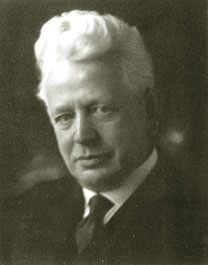Ernst Cassirer
German philosopher (1874–1945)
Ernst Cassirer (July 28, 1874 – April 13, 1945) was a German Jewish philosopher. Coming out of the Marburg tradition of neo-Kantianism, he developed a philosophy of culture as a theory of symbols founded in a phenomenology of knowledge. His son, Heinz Cassirer, was also a Kantian scholar.

Cassirer was elected to a chair of philosophy at the newly-founded University of Hamburg in 1919, where he lectured until 1933. After leaving Germany, he lectured at Oxford University 1933–1935, at Gothenburg University 1935–1941, at Yale University 1941–1943, and lastly at Columbia University 1943–1945 until his death.
| This article about a philosopher is a stub. You can help out with Wikiquote by expanding it! |
Sourced
editAn Essay on Man (1944)
edit- An Essay on Man: An Introduction to a Philosophy of Human Culture
- No former age was ever in such a favorable position with regard to the sources of our knowledge of human nature. Psychology, ethnology, anthropology, and history have amassed an astonishingly rich and constantly increasing body of facts. Our technical instruments for observation and experimentation have been immensely improved, and our analyses have become sharper and more penetrating. We appear, nevertheless, not yet to have found a method for the mastery and organization of this material.... Unless we succeed in finding a clue of Ariadne to lead us out of this labyrinth, we can have no real insight into the general character of human culture; we shall remain lost in a mass of disconnected and disintegrated data which seem to lack all conceptual unity.
- End of Chapter 1
Quotes about Cassirer
edit- I studied your treatise thoroughly and with very much interest and admired, above all, how securely you master the essence of relativity theory. I made brief comments in the margin where I was not completely in agreement. E.g., I could not accept your opinion about the Kant-Newton relationship with reference to space and time. Newton’s theory requires an absolute (objective) space in order to be able to attribute real meaning to acceleration, which Kant does not seem to have recognized.
- Albert Einstein, on Cassirer's manuscript of Zur Einsteinschen Relativitätstheorie (1921), letter to Ernst Cassirer, 5 June 1920
- I very much believe in the influence of magic and the subconscious on the literary process...I think that magic has to do with the subconscious, much as the ancient sorcerers believed. The identification of man with his material surroundings and his active participation in that world are detailed in the books of Carlos Castañeda, for example, as well as, on a different level, with the books of sociologists like Lévy-Bruhl and Ernest Cassirer, or Lévi-Strauss. The magical identification has a lot to do with literature, this alternate way of viewing the world.
- Rosario Ferré Interviews with Latin American Writers by Gazarian Gautier (1988)
- 1919...Henri Bergson, Karl Barth, Ernst Cassirer, Havelock Ellis, Karl Jaspers, John Maynard Keynes, Rudolf Steiner—indelible figures—were all active in their various spheres.
- Cynthia Ozick, Fame & Folly: Essays (1996)